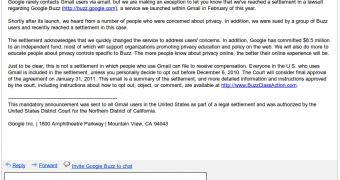If you're a Gmail user in the US, or use the English version of the email service, you've probably received a message from Google informing you on a Google Buzz settlement. The agreement had been reached a couple of months ago, but the company was required to inform all US users which were all part of the class action suit.
"Google rarely contacts Gmail users via email, but we are making an exception to let you know that we've reached a settlement in a lawsuit regarding Google Buzz, a service we launched within Gmail in February of this year," Google said in the email notification.
"The settlement acknowledges that we quickly changed the service to address users' concerns. In addition, Google has committed $8.5 million to an independent fund, most of which will support organizations promoting privacy education and policy on the web," it added.
Google doesn't break out too many details at this point, except to highlight the sum paid.
While Google will have to shell out $8.5 million, not even a drop in the bucket for the company, only $6 million of these will go towards groups advocating privacy, most of the rest goes to the lawyers in the case.
The seven original plaintiffs get just $2,500 each, an amount proportional to the damage, the judge decided.
As for the rest of American Gmail users, Google wants to make it sure they understand that they're not getting anything, monetary wise, from the lawsuit settlement.
"Just to be clear, this is not a settlement in which people who use Gmail can file to receive compensation. Everyone in the U.S. who uses Gmail is included in the settlement, unless you personally decide to opt out before December 6, 2010," Google explained.
Google Buzz was mired with controversy since the get go. One problem when launching a new social service is getting people to create the initial social graph.
Google believed it could get past that by automatically creating connections based on the contacts users communicated with the most. This, though, exposed the identity of the ones Gmail users sent the most emails to, something that many wanted to keep private.

 14 DAY TRIAL //
14 DAY TRIAL //